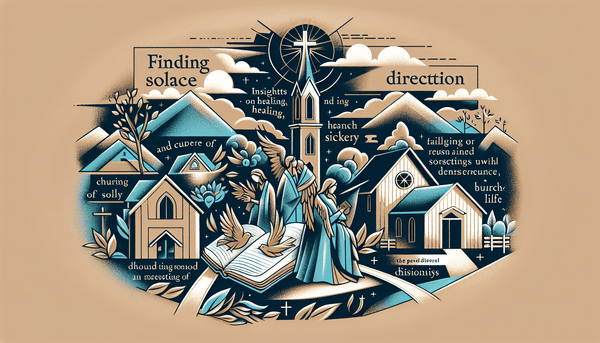The Nature of Faith
Faith is often associated with a strong belief or trust in something or someone, frequently without the need for tangible evidence. In the realms of the intangible, faith provides a sense of hope, comfort, and guidance, especially during challenging times. It is the 'assurance of things hoped for, the conviction of things not seen,' as eloquently stated in Hebrews 11:1. Indeed, faith is more than a mere sentiment; it is an active engagement with the divine, a trust that we 'walk by faith, not by sight' (2 Corinthians 5:7). It is a living, breathing entity that demands expression through actions, for 'faith by itself, if it does not have works, is dead' (James 2:17). And yet, at its core, faith is a simple directive from the lips of Christ: 'Have faith in God' (Mark 11:22), a call to trust in the divine narrative that unfolds in our lives, underscored by the grace that assures us, 'For by grace you have been saved through faith. And this is not your own doing; it is the gift of God' (Ephesians 2:8).
The Fruits of the Spirit
The fruits of the Spirit are the tangible expressions of a believer's inner transformation, reflecting the divine nature in everyday life. These virtues—love, joy, peace, forbearance, kindness, goodness, faithfulness, gentleness, and self-control—are the hallmarks of a life led by the Spirit, as outlined in Galatians 5:22-23. They are not mere moral attributes but the very essence of the divine life expressed through human actions, 'for the fruit of light is found in all that is good and right and true' (Ephesians 5:9). These fruits are garments we are called to wear, as we 'Put on then, as God's chosen ones, holy and beloved, compassionate hearts, kindness, humility, meekness, and patience' (Colossians 3:12). The fruit of love, especially, is the cornerstone, for 'whoever loves has been born of God and knows God' (1 John 4:7). By cultivating these fruits, we strive to supplement our faith with a cascade of virtues that lead to a comprehensive embodiment of godliness and love (2 Peter 1:5-7).
Conclusion
In the journey of faith, one discovers that it is not merely a destination but a continuous passage marked by growth, challenge, and insight. The Book of Job, with its enduring themes of suffering and righteousness, acts as a touchstone for believers, offering profound lessons on the nature of faith and divine justice. By engaging with scripture, communing with God through prayer, and participating in the life of a faith community, believers forge a path to a more profound faith. As they do so, the fruits of the Spirit begin to flourish within them, shining forth as beacons of hope and transformation in a world that yearns for the touch of the divine. Thus, in embracing the fullness of a Spirit-led life, one reflects the light of Christ, impacting the world with the profound virtues that define true discipleship.
FAQ
Q: What is faith?
A: Faith is a strong belief or trust in something or someone, often without tangible evidence. It is often associated with religious or spiritual beliefs but can also refer to trust in a person, an idea, or a higher power. Faith can provide a sense of hope, comfort, and guidance in times of uncertainty or difficulty.
Q: What is the meaning of Job 6?
A: Job 6 is a chapter in the Book of Job in the Bible where Job responds to his friend Eliphaz and expresses his deep anguish and suffering. He laments his heavy afflictions and longs for death, feeling overwhelmed by his troubles.
Q: What is the meaning of Job 7?
A: In Job 7, Job continues to express his deep anguish and despair in the midst of his suffering. He describes the fleeting nature of human life and the intense hardship he is enduring. Job questions the purpose of his suffering and wrestles with feelings of hopelessness.
Q: What is the meaning of Job 8?
A: In Job 8, one of Job's friends, Bildad the Shuhite, responds to Job's lament by speaking about the principle of divine retribution. He asserts that God is just and rewards the righteous while punishing the wicked. Bildad urges Job to seek God and repent of any wrongdoing, assuring him that God will restore him if he is truly righteous.





